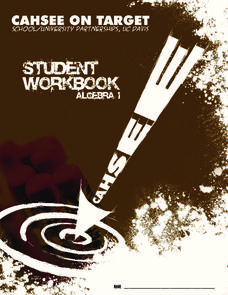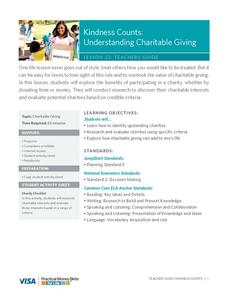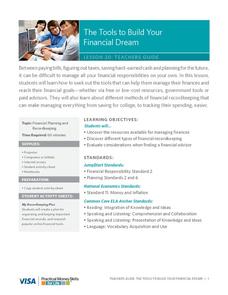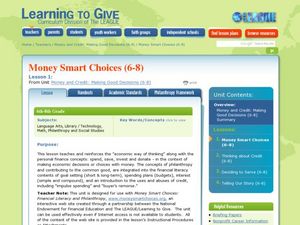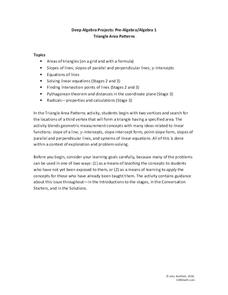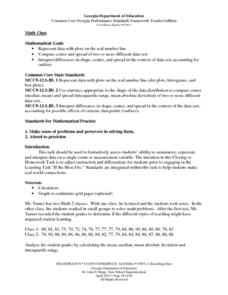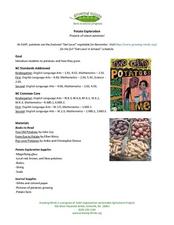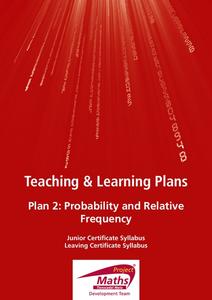Illustrative Mathematics
Setting Goals
Setting financial goals is a common occurrence in middle school that your learners can practice using this activity. They will be able to solve for how many hours Seth needs to work to save up for a skateboard, helmet, and trip. The...
University of California
Student Workbook: Algebra I
Need a helping hand in Algebra I? How about a giant, super-sized activity packet? Here is a resource that has worksheets for virtually every concept with some accompanying examples.
Practical Money Skills
Saving and Investing
Learn the difference between saving money and investing money, as well as the advantages and disadvantages of each. Kids review banking and personal finance terms before studying the different ways that people can reach their financial...
Visa
Kindness Counts: Understanding Charitable Giving
Financial literacy is generally focused on personal spending and saving, but consider an opportunity to talk to your pupils about how charitable giving can also factor into money management and how it can enhance life for both...
Practical Money Skills
Saving and Investing
You have to have money to make money, especially in the world of banking and investments. High schoolers learn about interest rates, saving and investment options, and ways to stay aware of their money's security and earning ability with...
Practical Money Skills
Student Loans
If your learners are college bound, they'll need a lesson about student loans and personal finance before they step into their dorm room. A four-day lesson guides high schoolers through the process of budgeting for college, as well as...
Visa
The Tools to Build Your Financial Dream
When it comes to all the ways money management and financial responsibility weave into our daily lives as adults, make sure high schoolers are prepared to locate resources for managing their finances, such as a financial advisor.
College Board
Try This! Calculus Teaching Tips
It's important to spice up your lessons. An online article discusses teaching strategies for AP® Calculus. In-class activities include matching games, placemats, multiple choice questions, scripted discussion, involuntary discussion,...
Curated OER
Money and Credit: Making Good Decisions
Learners participate in activities that teach them how to manage money. In this managing money lesson plan, students set long and short term goals for economic success by having discussions, identifying benefits of saving, and...
Federal Reserve Bank
Less Than Zero
Perry the penguin wants to buy a new scooter, but he doesn't have any funds! Walk your kids through the short book Less Than Zero, and have them track his borrowing, spending, and saving on a line graph while you read. Pupils will learn...
PwC Financial Literacy
Planning and Money Management: Spending and Saving
Financial literacy is such an important, and often-overlooked, skill to teach our young people. Here is a terrific lesson which has pupils explore how to come up with a personal budget. They consider income, saving, taxes, and their...
Practical Money Skills
Making Decisions
Money represents decisions: spending decisions, saving decisions, and investing decisions. Encourage young adults to think about the decisions they make with their money in a three-day unit about personal finance, consumer spending, and...
Practical Money Skills
Budgeting Your Money
How do you make sure that your income doesn't disappear before you have a chance to save it? Use a creative budgeting activity to teach learners in both special education and mainstream classes how to keep track of their expenditures and...
Practical Money Skills
Buying a Home
Guide high schoolers through the process of buying a house with a simulation lesson. As pupils learn about mortgages, renting versus buying, and home inspections, they discuss ways to make informed financial decisions and sound...
5280 Math
Triangle Area Patterns
Combine algebraic and geometric strategies to find solutions. The task asks learners to find the coordinates of a third vertex of a triangle to create a triangle with a specific area. The project is a set of seven problems that...
Georgia Department of Education
Math Class
Young analysts use real (provided) data from a class's test scores to practice using statistical tools. Not only do learners calculate measures of center and spread (including mean, median, deviation, and IQ range), but...
Practical Money Skills
Living on Your Own
Every teen dreams of living independently, but often without thinking about the details and costs involved with moving out. Three lessons in a unit about living on your own focus on moving costs, fixed and flexible costs associated...
Visa
Road Rules: Researching and Buying a Car
How do the loan principal, interest rate, and term all factor into a monthly car payment? Introduce your class to some of the key steps and considerations of obtaining a loan and purchasing a car.
New York State Education Department
TASC Transition Curriculum: Workshop 11
You'll C-E-R a difference in classroom achievement after using a helpful instructional activity. Designed for economics, civics, government, and US history classes, participants practice using the CER model to craft arguments about...
Illustrative Mathematics
Fractions and Rectangles
Visual models are excellent teaching tools when explaining equivalent fractions. Looking at a rectangle cut into twelfths, learners first identify the shaded fraction, and then explain whether the fraction is equal to one-fourth....
Growing Minds
Potato Exploration: Projects All About Potatoes!
How many potatoes tall are you? Unearth this rich resource! A reading of John Coy’s Two Old Potatoes begins a cross-curricular exploration of potatoes. Class members read, write, weigh, measure, and experiment with potatoes. Additional...
Practical Money Skills
Understanding Credit
Help your young consumers learn about credit and the importance of credit history. With a thorough lesson about the ins and outs of credit, as well as the potential pitfalls of having a line of credit, kids will be well-equipped to...
Noyce Foundation
Time to Get Clean
It's assessment time! Determine your young mathematicians' understanding of elapsed time with this brief, five-question quiz.
Project Maths
Probability and Relative Frequency
It's all relatively simple once you get the gist. Young mathematicians learn about sample spaces and simple probability by conducting an activity with dice. To complete the second of six parts in the Statistics and Probability unit, they...

